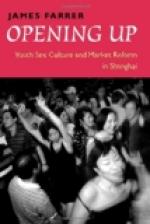Case A.—The father and mother of a boy close on thirteen came to see me before entering the lad. They had no idea that I was specially interested in purity-teaching; but they were anxious to ascertain what precautions we took against the corruption of small boys. They struck me as very good parents. I was specially pleased that they were alive to the dangers of impurity, and that the mother could advert openly to the matter without embarrassment. I advised them to give the boy explicit warning; but they said that they were anxious to preserve his innocence as long as possible. He was at present absolutely simple, and they hoped that he would long remain so. It was a comfort to them that I was interested in the subject, and they would leave the boy with confidence in my care. As soon as I saw the boy, I found it difficult to believe in his innocence; and I soon discovered that he was thoroughly corrupt. Not merely did he begin almost at once to corrupt other boys, but he actually gave them his views on brothels! In a private interview with me he admitted all this, and told me that he was corrupted at ten years of age, when he was sent, after convalescence from scarlet fever, to a country village for three months. There he seems to have associated with a group of street boys, who gave him such information as they had, and initiated him into self-abuse. Since then he had been greedily seeking further information and passing it on.
Case B.—A delicate, gentle boy of eleven, an only son, was sent to me by an intellectual father, who had been his constant companion. The lad was very amiable and well-intentioned. A year later he gave me particulars of his corruption by a cousin, who was three years older than he. Since that time—particularly of late—he had practised masturbation. He had not the least idea that it was hurtful or even unrefined, and thought that it was peculiar to himself and his cousin. He knew from his cousin the chief facts of maternity and paternity, but had not spoken to other boys about them. He was intensely anxious to cleanse himself entirely, and promised to let me know of any lapse, should it occur. In the following vacation he developed pneumonia. For some days his life hung in the balance, and then flickered out. His father wrote me a letter of noble resignation. Terribly as he felt his loss, he was greatly consoled, he said, by the knowledge that his boy had died while his mind was innocent and before he could know even what temptation was. It is needless to add that I never hinted the real facts to the father; and—without altering any material detail—I am disguising the case lest it should possibly be recognised by him. I have often wondered whether, when the lad’s life hung in the balance, it might not have been saved if Death’s scale had not been weighted by the child’s lowered vitality.




